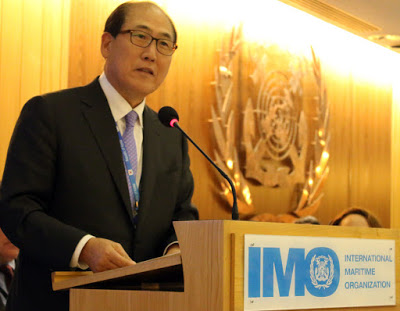| …Encourages cooperation among stakeholders |
| IMO Secretary-General, Kitack Lim |
has intensified the awareness among stakeholders, on the proposed sulphur emission
cuts from ships to a limit of 0.5% m/m (mass by mass) for those operating outside designated
emission control areas, while those in designated emission control areas would
remain at 0.10% by 1 January, 2020.
According to the IMO, the initiative
will benefit human health and the environment, though it would also represent a
challenge for the industry.
during a symposium on IMO 2020 and Alternative Fuels, which held at the IMO
on October 17 and 18 and attended by over 300 delegates, said: “Collaborations
among key stakeholders is essential for the smooth landing of the IMO 2020.”
undertaken so much work preparing for IMO 2020, considering that the date had been
confirmed since 2016, as well as series of guidance and guidelines for shipowners , and flag and port States.
and necessary because the current limit is 3.50%, making the proposed new
limits to mark a significant change, and for most ships, it would mean a switch
to new types of compliant fuel oils; the very low sulphur oil (VLSFO), and the
blends are new to the market, the IMO said.
and supply of the new compliant fuel oil is high, though representatives from
the oil and gas industry confirmed that
the product would be available in most locations and many ships would be
loading the new compliant fuel oils before the end of 2019.
concluded that with time the price and demand and supply would achieve a balance,
considering that there are many actors, from refiners, to bunker suppliers, to
ships and the shipping industry.
is all going to be about market dynamics – but supply and demand will get in
balance. It will not be an easy transition, but we will get there,” said
Eddy van Bouwel, Chair, marine fuels committee, IPIECA.
blends of fuel oil might bring, including potential quality issues providing
challenges, in particular to the ship’s engineers, and the need for
preparedness was reiterated, including crew training and reviewing clauses in
charter parties.
(which will be installed on around 4,000 ships) and – to a lesser extent – LNG,
are being used to meet the sulphur 2020 limit as well as the potential to
reduce other emissions from ships.
Member Governments, those from shipping, refineries, fuel oil suppliers and legal
professionals were in attendance.
Environment Division, reiterated the importance of cooperation among all
stakeholders and encouraged Member Governments, shipping, refinery, fuel oil
supply and relevant industries, as well as charterers, to finalize their
preparations for IMO 2020.
support the consistent implementation of IMO 2020 on Sulphur limit.
Credit: IMO

